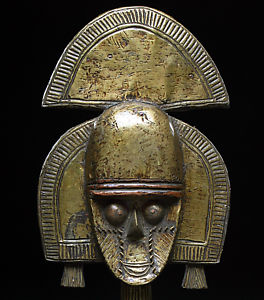| Location: |
Eastern Angola, western Zambia | | Population: |
20,000 |
| Language: |
Luvale (Bantu) |
| Neighbors: |
Chokwe, Luba, Lunda, Luchazi, Ovimbundu, Songo |
| Types of Art: |
Most Luvale art is in the form of masks, many of which are danced during initiation ceremonies to educate the initiates and to mark the territory where the ceremonies take place. |
| History: |
Luvale (Lwena in Angola) peoples are closely related to Chokwe, and their history is interconnected with both Chokwe and Lunda political movements, which have historically dominated the region. Between 1600 and 1850 they were under considerable influence from the Lunda states and were centrally located in Angola. In the second half of the 19th century, considerable development of the trade routes between the Chokwe homelands and the Angolan coast led to an increased participation in trade of ivory and rubber. Wealth acquired from this allowed the Chokwe kingdom to expand, eventually overtaking the Lunda states that had held sway over them for so long. |
| Economy: |
The mainly agrarian Luvale economy is centered around the staple crops of manioc, cassava, yams, and peanuts. Tobacco and hemp are also grown for snuff, and maize is grown for beer. Domesticated livestock is also kept and includes sheep, goats, pigs, and chickens. Meat supplements are garnered through hunting. There is a exclusive association of big game hunters (Yanga), but everyone contributes to the capture of small game animals. The farming and processing of agricultural products is done almost exclusively by women among the Luvale. Slash and burn techniques and crop rotation are practiced to naturally conserve the land. |
| Political Systems: |
Luvale do not recognize a paramount leader, but instead offer allegiance to local chiefs who inherit their positions matrilineally from the maternal uncle. The chiefs (mwana nganga) consult with a committee of elders and ritual specialists before making decisions. Villages are divided into manageable sections, which are governed by family headmen. All members of Luvale society are divided into two categories, those who are descended from the founding matrilineal lines and those who are descended from former enslaved populations. |
| Religion: |
Luvale recognize a god of creation and supreme power (Kalunga) and a series of nature and ancestral spirits (mahamba). These spirits may belong to the individual, the family, or the community, and neglecting them is sure to result in personal or collective misfortune. Evil spirits may also be activated by sorcerers (orwanga) to cause illness, and this must be counteracted to regain health. In order to accomplish this, individuals normally consult with a diviner (Nganga), who attempts to uncover the source of the patient's problem. The most common form of divination among Luvale involves basket divination, which consists of the tossing of up to sixty individual objects in a basket. The configuration of the objects is then "read" by the diviner to determine the cause of illness. |
| Credit: |
McIntyre, L. Lee and Christopher D. Roy. 'Art and Life in Africa Online.' 1998: The Art and Life in Africa Project, http://www.uiowa.edu/%7Eafricart/toc/people.html |
|

